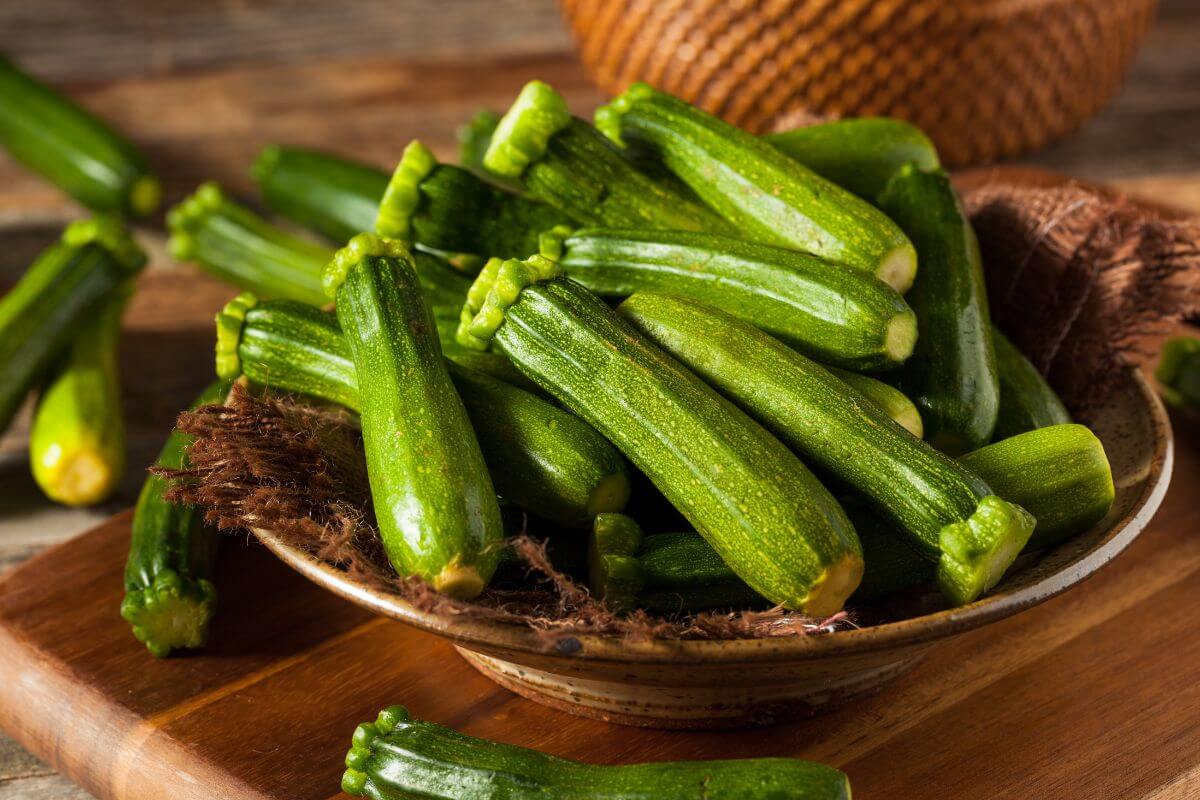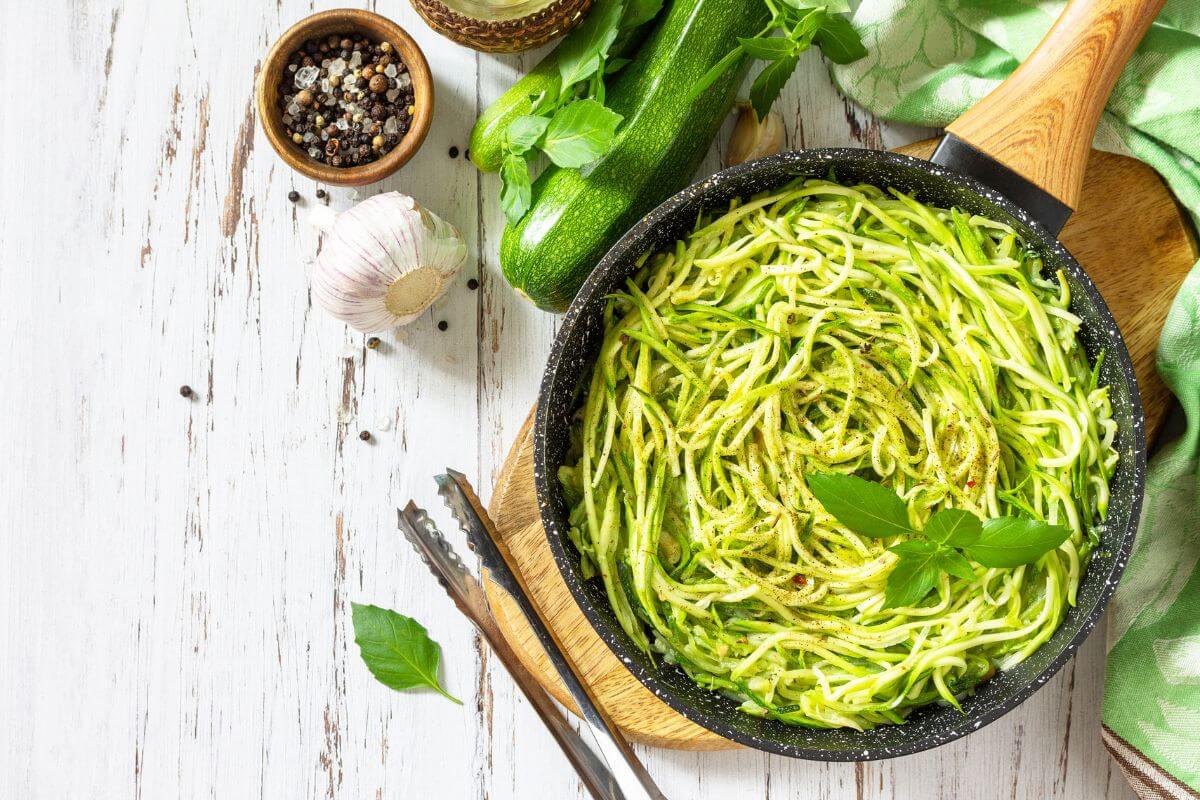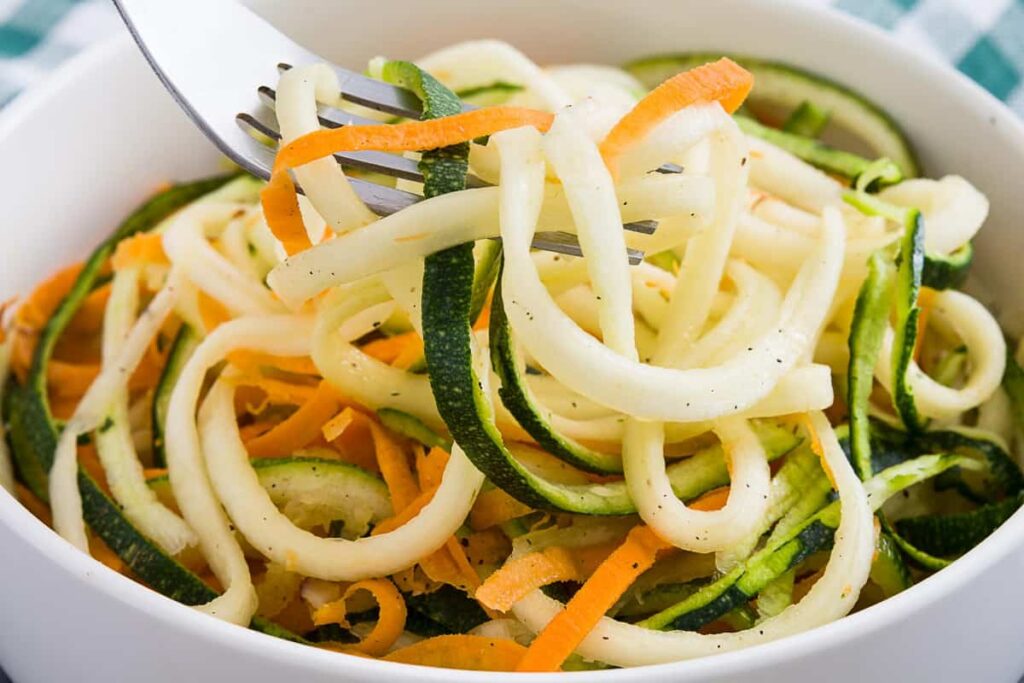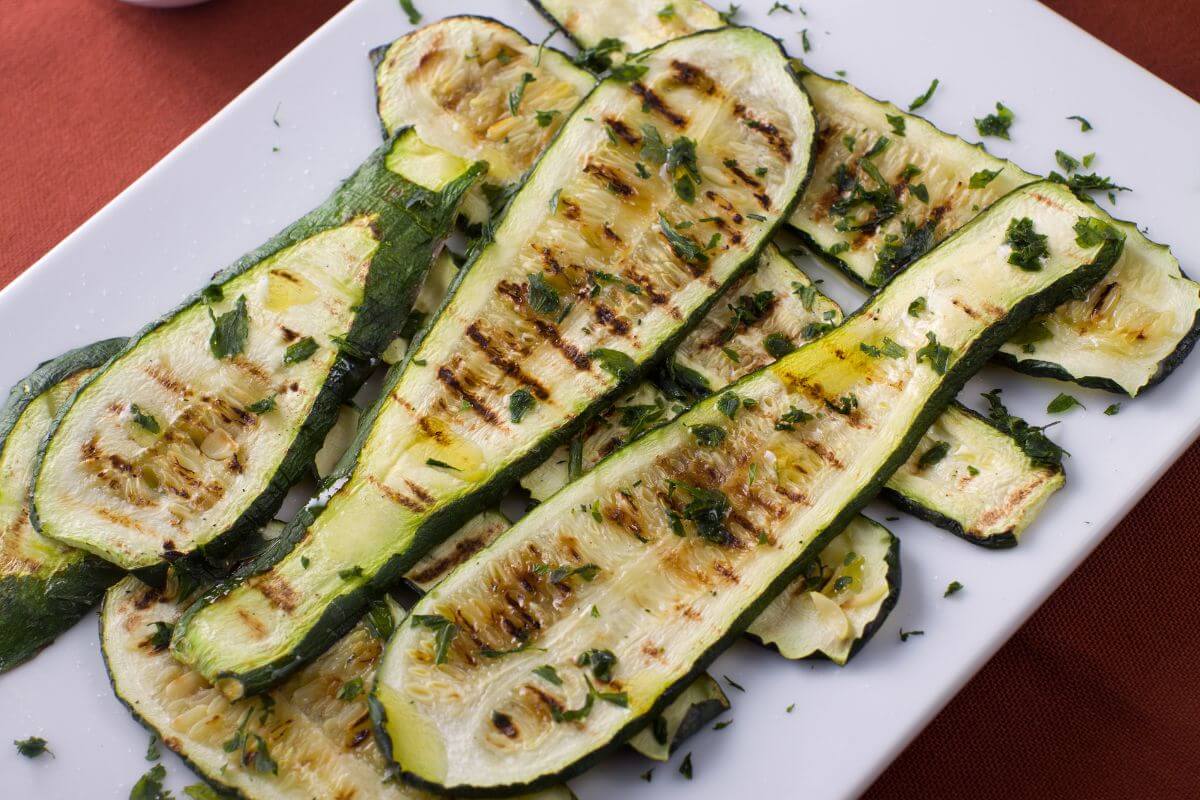Are you confused as to whether zucchini is a fruit or vegetable?
A favorite in summer meal fare, the zucchini is generally regarded as a vegetable. But is it really? The answer may be surprising.
This article will take a look at what botanists say and what the USDA says.
- Related article: How to Differentiate Fruits vs Vegetables?
Is Zucchini a Fruit or Vegetable?

Zucchini is both a fruit and a vegetable. By the botanical definition, zucchini is a fruit. By the culinary definition and by the USDA, zucchini is a vegetable.
Zucchini is a Fruit
Botanically, a fruit is the ripened ovary of a plant’s flower. When a zucchini develops, it does so from a zucchini plant flower.
Fruit also contains seeds for reproduction. Zucchinis contain seeds. They scientifically fit the definition of fruit.
Zucchini is botanically known as Cucurbita pepo andbelongs to the Cucurbitaceae family. Their classification as pepo makes them a berry. Berries feature a three-layered design.
A berry contains all three layers with the outer skin named the exocarp. The fleshy middle layer is called the mesocarp. An inner layer holding seeds is referred to as the endocarp.
Berries are born from a single bloom with a single ovary. They must contain at least two seeds, hence, the zucchini qualifies!
Zucchini flowers are also edible and are often fried as a great appetizer or side dish.
Zucchini is a Vegetable
Vegetables are classified as the edible parts of plants that are not fruit. These edible parts include the roots, leaves, tubers, and stems of plants.
In these terms, zucchinis are botanically considered as fruit. But a broader definition of vegetables includes fruit because it is an edible part of a plant. In this sense, all fruits would also be vegetables.
Even for the United States Department of Agriculture (USDA), zucchini is in the Vegetable Group list.
People who prepare and eat zucchini generally consider them a vegetable due to their culinary use. Zucchini resemble cucumbers, which are also fruit. Like cucumbers, they are prepared in savory cuisine most of the time.
Zucchinis are highly palatable when baked, fried, roasted, grilled, or seared. They can be used in salads, stir fries, pasta, and rice dishes, and in side dishes. So, while science labels them a fruit, other people legitimately consider them a vegetable.
The one exception to this may be their use in zucchini bread which is sweeter. This is, however, an exception.
Zucchini Health Benefits

Zucchini ranks as a superfood for nutrition purposes. It has a high antioxidant level, water, and fiber content. Consider these healthy benefits when adding it to your diet.
1. Zucchini Aids in Digestion
Zucchini contains quite a bit of water. This will soften stools and prevent constipation. It also comes with soluble and insoluble fiber. Soluble fiber nourishes good gut bacteria.
The good gut bacteria produce short-chain fatty acids that feed gut cells. These acids also aid in inflammation reduction. They support health issues like ulcerative colitis, Crohn’s disease, and Irritable Bowel Syndrome.
2. Zucchini Lowers Blood Sugar Levels
For those who have type 2 diabetes, zucchini may help manage and lower your blood sugar levels. It is a viable alternative to pastas and carbohydrates.
Many spiralize zucchini as a substitute for noodles. Diets low in carbohydrates lower insulin and blood sugar levels. They also can reduce the need for medication.
Zucchini’s fiber content also can stabilize levels to prevent blood sugar spiking.
3. Zucchini Aids Heart Health

High fiber not only helps with digestion and blood sugar levels but works to protect the heart as well. Research demonstrates that higher fiber dietary intake lowers the risk of cardiovascular disease.
The soluble fiber Pectin in zucchini reduces bad LDL cholesterol levels. Zucchini is rich in potassium as well. Potassium dilates blood vessels, reducing high blood pressure. Lower blood pressure levels reduce the risk of stroke and cardiovascular disease.
4. Zucchini Aids in Vision Health
Rich in vitamin C and beta-carotene, zucchini aids eye health. Zucchini also contains two very important antioxidants for vision improvement, lutein and zeaxanthin.
Better eye health lowers the risk of age-related diseases like macular degeneration. This disease is the principal cause in older adults of vision loss.
5. Zucchini Aids Weight Loss and Management
Eating zucchini regularly as a part of your diet can help you lose weight. It is low in calories and has a high water content to help you feel full. Fiber content can aid in reducing appetite.
Research shows that higher fruit and vegetable consumption can slow weight gain. You’ll feel satiated and reduce calorie intake to assist in weight loss.
Zucchini Nutrition Facts
When zucchini is described as a superfood, there is good reason. A single cup of cooked zucchini is only 17 calories and offers you these nutrients:
- 1 gram of protein
- Less than 1 gram of fat
- 3 grams of carbohydrates
- 1 gram of sugar
- 40% of the Reference Daily Intake (RDI) of vitamin A
- 14% RDI of vitamin C
- 9% RDI of vitamin K
- 7% RDI of vitamin B6
- 16% RDI of manganese
- 13% RDI of potassium
- 10% RDI of magnesium
- 8% RDI of folate
- 8% of RDI of copper
- 7% of RDI of phosphorous
- 5% of RDI of thiamine
Now that’s impressive! Zucchini also contains traces of calcium, iron, zinc, and some more B vitamins.
Adding Zucchini to Your Diet

This fruit/vegetable is very simple to add to your diet. Consider these methods for getting your daily dose of superfood power.
- Sauté zucchini with a spoon of olive oil.
- Bake it in breads, muffins, or cakes.
- Grill it with a little garlic and oil.
- Bread it and fry it up.
- Add it raw to your salad.
- Stew it in ratatouille.
- Stuff it with other veggies, meat, rice, or cheese and bake it.
- Boil it and add to soups.
- Spiralize it to substitute for noodles.
Is Zucchini a Fruit or Vegetable? Final Thoughts
Zucchini is considered a fruit and a vegetable. No matter what you count the zucchini as, it’s an excellent source of nutrition. It is loaded with healthy carbs, minerals, and vitamins.
Zucchini is also easy to prepare and adds variety to your meals. It’s versatile too. Add it to salads, sandwiches, pasta dishes, casseroles, and much more.
You may also be interested in these related articles:

